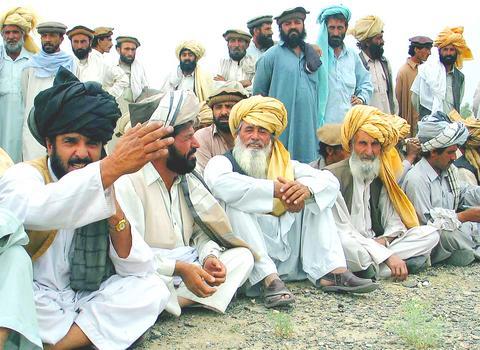An intense manhunt will ultimately net the US' No. 1 enemy, Osama bin Laden, but there is no telling how long the hunt might take, the chairman of the US joint chiefs of staff said during a visit to Afghanistan.
General Richard Myers denounced bin Laden's latest taped message, saying its barbarity was a reminder that US forces are involved in "a fight for freedom and civilization."

PHOTO: REUTERS
Two and a half years after their al-Qaeda group organized the deadliest terror attack in history, bin Laden and his deputy, Ayman al-Zawahri, are still at large and believed hiding in the craggy mountains along border dividing Pakistan and Afghanistan. A dragnet involving thousands of troops has also failed to track down Taliban leader Mullah Omar or renegade Afghan warlord Gulbuddin Hekmatyar.
Catching the men is considered a top priority and would be an enormous boost to US President George W. Bush ahead of the November elections in the US -- the reward for information leading to bin Laden's capture was recently raised to US$50 million.
Myers insisted during his visit Friday that he has not grown frustrated at the military's inability to locate bin Laden and his deputy, or at the terror leaders' success at smuggling anti-American audio messages out from their hiding places.
"We will be successful against al-Qaeda and their leadership, but I'm not going to put a timeline on it, because I just can't tell you," he told reporters at Kabul airport before departing. "One or two people hiding in very tough terrain where they have either paid for their security or have sympathizers ... this is very difficult work."
Buoyed by the capture of Saddam Hussein in Iraq, the US military had boasted in January that it was sure it would catch the al-Qaeda chiefs by the end of the year. It backed off those predictions last weekend.
In the past month, Washington has ordered 2,000 Marines to Afghanistan to beef up a US-led force that had already numbered 13,500 soldiers -- taking troop strength to the highest level it has been since the ouster of the Taliban at the end of 2001. The forces, from the 22nd Marine Expeditionary Unit, have been arriving since late last month.
The military has vowed a sweeping spring offensive to crush remaining Taliban and al-Qaeda holdouts ahead of Afghan presidential and parliamentary elections scheduled for September. Myers said the election, and an anticipated uptick in terrorism during the spring thaw, were the main reasons for bringing in the Marines.
He said he did not feel any additional troops are needed in Afghanistan or Iraq.
In the audio tape, which the CIA has said appeared to be authentic and recorded in the past week, bin Laden offered European nations a truce if they pull troops out of Muslim countries -- and threatened violence against the US and Israel.
Myers said the tape "just reminds us once again what kind of extremism we are up against, and it is useful to have a reminder every once in a while about the type of threat we face and how serious it is to those who want to live in a free and democratic environment."
"This is really a fight for freedom and civilization in many respects," he added.

VAGUE: The criteria of the amnesty remain unclear, but it would cover political violence from 1999 to today, and those convicted of murder or drug trafficking would not qualify Venezuelan Acting President Delcy Rodriguez on Friday announced an amnesty bill that could lead to the release of hundreds of prisoners, including opposition leaders, journalists and human rights activists detained for political reasons. The measure had long been sought by the US-backed opposition. It is the latest concession Rodriguez has made since taking the reins of the country on Jan. 3 after the brazen seizure of then-Venezuelan president Nicolas Maduro. Rodriguez told a gathering of justices, magistrates, ministers, military brass and other government leaders that the ruling party-controlled Venezuelan National Assembly would take up the bill with urgency. Rodriguez also announced the shutdown

Chinese President Xi Jinping’s (習近平) purge of his most senior general is driven by his effort to both secure “total control” of his military and root out corruption, US Ambassador to China David Perdue said told Bloomberg Television yesterday. The probe into Zhang Youxia (張又俠), Xi’s second-in-command, announced over the weekend, is a “major development,” Perdue said, citing the family connections the vice chair of China’s apex military commission has with Xi. Chinese authorities said Zhang was being investigated for suspected serious discipline and law violations, without disclosing further details. “I take him at his word that there’s a corruption effort under

China executed 11 people linked to Myanmar criminal gangs, including “key members” of telecom scam operations, state media reported yesterday, as Beijing toughens its response to the sprawling, transnational industry. Fraud compounds where scammers lure Internet users into fake romantic relationships and cryptocurrency investments have flourished across Southeast Asia, including in Myanmar. Initially largely targeting Chinese speakers, the criminal groups behind the compounds have expanded operations into multiple languages to steal from victims around the world. Those conducting the scams are sometimes willing con artists, and other times trafficked foreign nationals forced to work. In the past few years, Beijing has stepped up cooperation

Exiled Tibetans began a unique global election yesterday for a government representing a homeland many have never seen, as part of a democratic exercise voters say carries great weight. From red-robed Buddhist monks in the snowy Himalayas, to political exiles in megacities across South Asia, to refugees in Australia, Europe and North America, voting takes place in 27 countries — but not China. “Elections ... show that the struggle for Tibet’s freedom and independence continues from generation to generation,” said candidate Gyaltsen Chokye, 33, who is based in the Indian hill-town of Dharamsala, headquarters of the government-in-exile, the Central Tibetan Administration (CTA). It